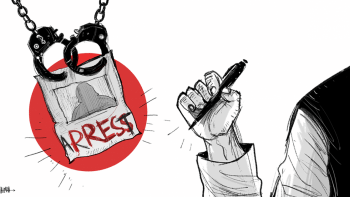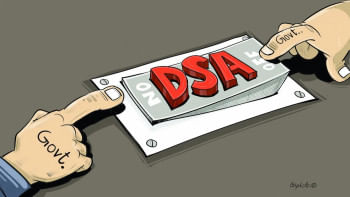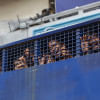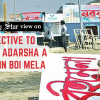Why the DSA should be scrapped

Over the last few months, the draconian Digital Security Act (DSA), 2018 has come under intense scrutiny. Journalists, lawyers, human rights defenders, teachers, students, and various civic bodies at home and rights organisations abroad have been demanding a re-examination of the law. While some are asking for its thorough amendment, others firmly hold the view that the act needs to be repealed. The rash increase in the law's application in recent months and the death of a woman charged under the DSA in custody appear to have partly swayed the opinion of the common masses against the law. Though many a time senior functionaries of the state publicly acknowledged the gaps that exist in the law, little was done to amend it. As international pressure mounted, the law minister conceded to consider only amending the rule pertaining to the act. Jurists and activists raise the question: can any substantive law be modified through a rule, a subordinate legislation?
While the state remained unyielding, political opponents and dissenting voices suffered immeasurably. Many women and children also became victims of the DSA. It was at this point that the Office of the United Nations High Commissioner for Human Rights (OHCHR) called on the Bangladesh authorities to impose an immediate moratorium on the use of DSA and "to reform comprehensively its provisions to bring them in line with the requirements of international human rights law." The OHCHR recommended scrapping of sections 21 and 28 and amending eight other sections of the law. The commissioner reminded the government that his office had consistently raised concerns about the overly broad and ill-defined provisions of the DSA. He called for the creation of an independent judicial panel to review all pending cases brought under the DSA with a view to those accused being released.
The government's failure in delivering on its promise to establish safeguards against the arbitrary or excessive application of the law is noteworthy. It was only on May 3 that the law minister announced that a few provisions of the DSA would be amended by September. While the ministerial pronouncement has been welcomed by those who favour amendment, albeit with a degree of scepticism, others remain resolute in their demand for scrapping the law. This piece presents the arguments for repealing the DSA, made at a recent webinar organised by Nagorik, a platform for human rights and the rule of law.
The principal weakness of the DSA is that many of its provisions impinge on citizens' rights: freedom of expression and the right to privacy of communication. There was little disputation that its key aim was reinstating Section 57 of the ICT Act, 2006 (amended in 2009 and 2013) which the state was forced to discard in view of widespread public condemnation of its misuse.
The participants believed that the law, formulated weeks before the 2018 elections, in all likelihood, was intended to curtail key fundamental rights accorded by the constitution. It also contradicts several other laws, regulations and guidelines. Most importantly, it contradicts the right to equal protection of law as guaranteed by Article 27 of the constitution. Several provisions of the DSA directly contravene the much-celebrated Right to Information (RTI) Act. The DSA has slashed some important rights that citizens enjoy under other laws. For example, the Disclosure of Public Interest Information (Protection) Act, 2011 provides adequate protection to whistleblowers for exposing wrongdoers, but Section 32 of DSA prohibits access to that information in the name of state secrecy and security. Likewise, while the Children Act, 2013 provides substantial protection to children from being prosecuted in criminal cases, the DSA has been indiscriminately applied to children as well.
A major weakness of the law is its inconsistency with the other existing laws. Section 29 of DSA provides for three years' jail sentence for defamation and up to Tk 5 lakh fine; the punishment gets harsher for committing the offence a second time. Section 500 of the Penal Code, on the other hand, provides two years' jail sentence with a fine for the same offence. The offence remains the same, but the punishment differs in two different platforms, which is discriminatory and not tenable as per provisions of Article 27 of the constitution. On several occasions, ministerial promises were made that the state would treat journalists with particular care in registering cases against them under the DSA. Does preferential treatment of a particular group in the application of the law not breach the equality clause enshrined in Article 27 of the constitution?
In several cases, the accused have alleged that they were tortured in custody. Two detainees, Mushtaq Ahmed and Sultana Jasmine, died in such facilities, with families claiming they died due to torture.
Sections 17 (on unauthorised access to information infrastructure), 18 (on unauthorised access to computers, digital devices, computer systems, etc), 19 (on damaging computers and computer systems), 20 (pertaining to change of computer code), 33 (unauthorised access acquisition and storage of information), and 34 (on hacking) of the DSA suffer from several weaknesses. Many of these provisions remain vague and undefined. Those convey the message that the law did not adequately consider the issue of intent and thus failed to distinguish between criminal acts and creative pursuits and between hacking for public interest and hacking with criminal intent.
As a state party to several international human rights treaties, it is incumbent on Bangladesh to abide by the provisions of those instruments. Any restriction imposed on freedom of expression and communication must uphold three fundamental principles: a) should be established by law; b) have to be framed with legitimate aims; and c) the necessity and proportionality doctrines should be strictly adhered to. The DSA does not meet principles (b) and (c) and thus falls short of upholding international standards.
In addition to identifying substantive anomalies of the law with the constitution and other laws and regulations, the participants of the webinar highlighted serious gaps in its enforcement. Since its inception in 2018, the law has become a major source of criminalisation of legitimate expression, judicial harassment and suffering for the innocent. A review of 1,228 cases of Dhaka Cyber Tribunal, under the ICT Act and DSA, filed between October 15, 2018 and March 31, 2021, informs that 47 percent were dismissed at the first hearing. In most such cases, the accused had to endure severe financial and other hardships and mental trauma.
The law requires the police to complete an investigation within 75 days, but that deadline is hardly met. In many cases, if the investigating officers file reports, they do much later than the time stipulated under the law. The act requires the judges to complete trials within six months, and if they cannot meet the deadline, they can request a three-month extension in writing. If the trial does not conclude in time, the judge can continue proceedings by submitting a report to the High Court explaining the delay. In most cases, such a procedure is not followed. Instances were cited in which, even after the cases were quashed, the jail authority took unreasonable time to release the detainee.
The law stipulates the establishment of a Cyber Appellate Tribunal. The state is yet to form the tribunal in more than four years since the law was enacted, and thus the litigants have no other option but to move to the High Court, navigating a complex and time-consuming process.
In several cases, the accused have alleged that they were tortured in custody. Two detainees, Mushtaq Ahmed and Sultana Jasmine, died in such facilities, with families claiming they died due to torture. Recently cases have been reported in which the accused were subjected to involuntary disappearance for lengths of time before subsequently "shown arrested" by law enforcement agencies. Such treatment of detainees is in stark violation of Articles 31, 32 and 33 of the constitution and the provisions of the Torture and Custodial Death (Prohibition) Act, 2013. It also breaches Supreme Court directives on the treatment of detainees issued in the BLAST vs Bangladesh & Others case.
The act effectively criminalises people's initiatives for good governance. The lodging of a number of cases against active citizens exposing wrongdoings of state functionaries and people's representatives and expressing concerns about public health issues during the Covid pandemic is a case in point.
The participants noted that contrary to children, anti-trafficking, and migration laws that ensured a reasonable degree of stakeholder consultation, the DSA was formulated with little input from the stakeholders, particularly from civil society. The vast and disproportionate number of cases filed against the political opposition and those expressing independent views since its inception only indicate that the DSA has become a handy tool to suppress dissent. Also, it has a dampening effect on critical thinking and creative quests. Contrary to those who view the DSA as a purposeful and necessary law that requires minor amends, the webinar participants unanimously rejected such contention and called for its immediate abrogation.
Dr CR Abrar is an academic with an interest in human rights issues.
Barrister Jyotirmoy Barua is an advocate at the Supreme Court of Bangladesh.
Rezaur Rahman Lenin is an academic activist.


 For all latest news, follow The Daily Star's Google News channel.
For all latest news, follow The Daily Star's Google News channel. 










Comments